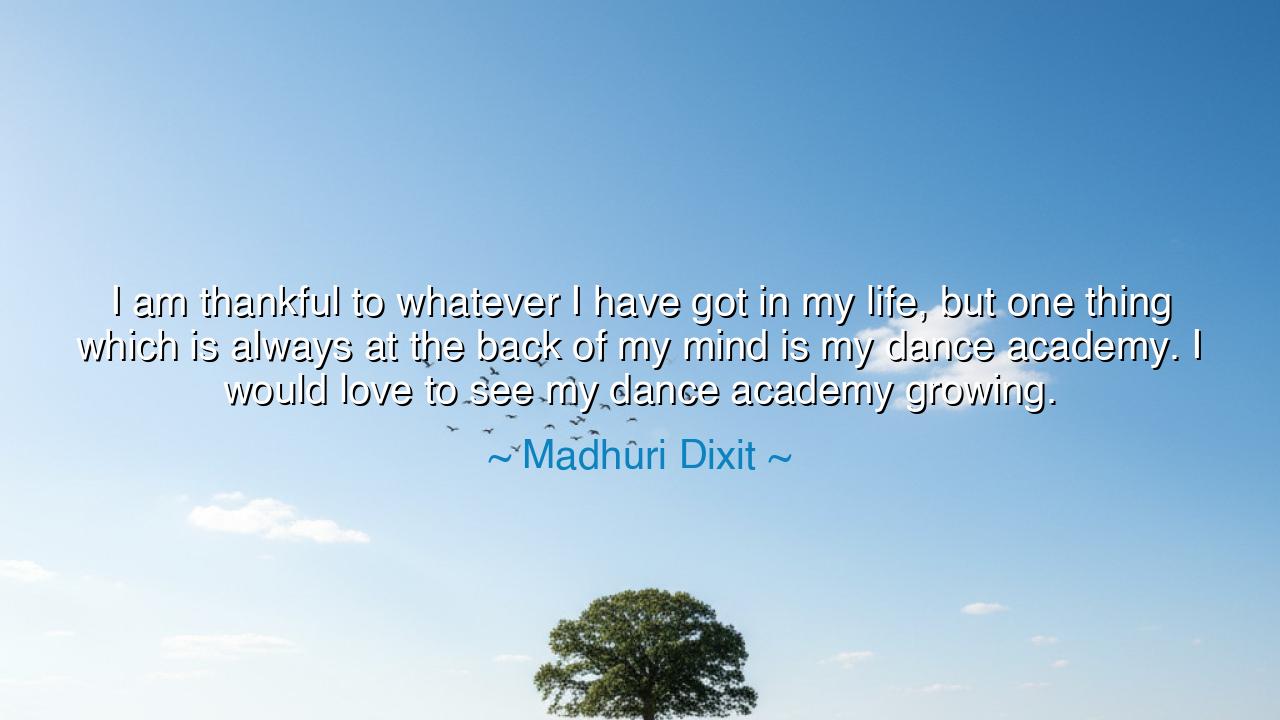
I am thankful to whatever I have got in my life, but one thing
I am thankful to whatever I have got in my life, but one thing which is always at the back of my mind is my dance academy. I would love to see my dance academy growing.






In the words of Madhuri Dixit, the great dancer and artist of our age, there shines both humility and longing: “I am thankful to whatever I have got in my life, but one thing which is always at the back of my mind is my dance academy. I would love to see my dance academy growing.” This statement, simple in form, carries within it the eternal tension between gratitude for blessings received and the yearning to nurture a legacy that outlives the self. She honors the gifts of her life, yet she confesses that her heart is drawn always toward the flourishing of her dance academy, the vessel of her art’s immortality.
At its core, this quote reveals the dual truth of gratitude and aspiration. Gratitude anchors us, reminding us to cherish the riches already given—fame, success, health, love. Yet aspiration compels us forward, ensuring that satisfaction does not slip into stagnation. Madhuri embodies this balance: she is thankful for her accomplishments, but her spirit is not content merely to rest upon them. Instead, she longs to see her academy, the sanctuary of her art, grow and thrive, so that her gift may be carried into future generations.
This yearning finds its roots in the nature of art itself. For dance, like song or poetry, is fleeting—it lives in the moment of performance and then vanishes like breath. To establish an academy is to give form and permanence to what is otherwise transient. It is to plant seeds of artistry in younger souls, ensuring that the rhythm of movement and the discipline of the body will continue long after the artist herself is gone. In this way, her gratitude for life’s blessings turns naturally into a desire to preserve and multiply them.
History speaks with a similar voice. Consider Plato, the student of Socrates, who was not content merely to remember his teacher’s wisdom. Instead, he founded the Academy, the first great school of philosophy, where knowledge could be passed down systematically to generations unborn. Through that act, Socrates’ words, once fleeting in the marketplace, became immortal in the minds of students and the pages of history. So too does Madhuri Dixit long for her dance academy to become not only a house of teaching, but a monument to art that endures beyond her own lifetime.
There is also in her words a subtle acknowledgment of the restlessness of legacy. Even amidst gratitude, the heart yearns for its work to matter beyond the boundaries of the self. This is no weakness, but the natural desire of the human spirit: to leave behind more than footprints in the dust, to leave instead a temple where others may worship beauty, discipline, and truth. For the academy she envisions is not only about steps and rhythm, but about cultivating the virtues of perseverance, expression, and the unity of mind and body.
The lesson here is profound: one must balance gratitude for the present with vision for the future. To live only in aspiration is to be forever dissatisfied, but to live only in gratitude is to risk burying the talents entrusted to us. True wisdom is to give thanks for all one has been given, while also laboring to build something that will bless others long after we are gone.
Practically, this means asking ourselves: What legacy am I cultivating? What am I building that will outlast me? Whether in the form of schools, families, communities, or works of art, we must tend to our visions with love, even as we give thanks for what we already hold. Gratitude fills the heart, but legacy gives it purpose.
Thus the wisdom of Madhuri Dixit endures: “I would love to see my dance academy growing.” Her words are not merely about dance, but about the universal desire to see one’s life become a seedbed for future generations. Let us, then, live with gratitude for what has been given, but also with courage to build what must yet be done. In this balance, we honor the past, enrich the present, and prepare the future.






AAdministratorAdministrator
Welcome, honored guests. Please leave a comment, we will respond soon